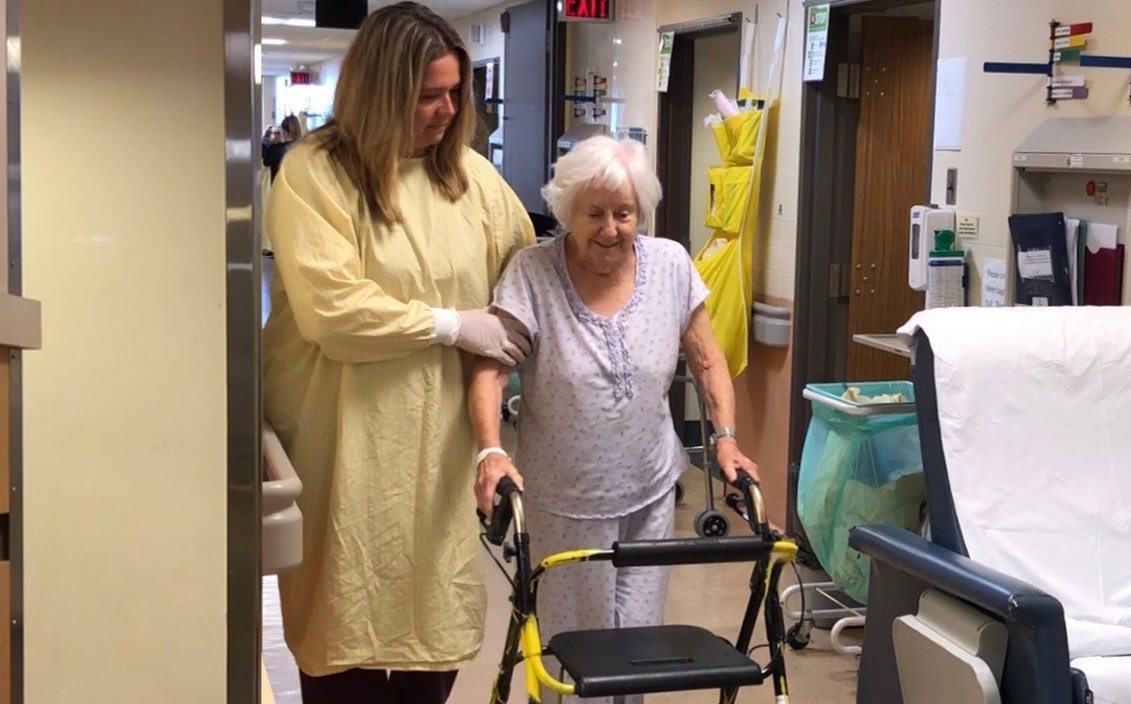WRH Launches the Movement Matters Program
17-9-2019

Windsor Regional Hospital is encouraging a target group of “at-risk” patients to take a walk, log their steps and see how far they can go on the Road to Recovery. The Movement Matters – One Step at a Time Program kicked off today with a pep rally to encourage participation at both hospital campuses.
The program goal is to get “at-risk” patients, including seniors who are most likely to stay in bed during their hospital stay, up and moving, to speed up their recoveries while preventing unnecessary complications that could lead to longer hospital stays.
A study by the Council of Academic Hospitals of Ontario shows one-third of older patients who are hospitalized develop new disabilities that affect their daily living during their hospital stay. Half of those patients are unable to recover function.
“We don’t want our patients who come to the hospital to get better to leave with new or worse conditions because they stayed in bed the whole time they were here,” says Karen McCullough, Chief Operating Officer and Chief Nursing Executive. “So it is important we keep them moving.”
As part of the Movement Matters Program, “at-risk” patients who need help getting up and moving, are identified when they are admitted into the hospital. Referred patients work with their care teams to set appropriate mobility goals and then track and monitor how far they go. Every time participating patients walk to the washroom, down the hall or around the unit floor, the distance covered is recorded in their charts.
A map of Windsor is now on display in each participating unit. Each week, the ambulation team will tally the total distance covered on each unit and track it on the map. The total distance covered by patients on all units at both WRH campuses will be tracked and shared across the organization and online on the WRH Road to Recovery Map.
“It’s not a race,” says Kristie Cecile, Director of Medicine. “We want to encourage our patients to take that extra step, go the extra mile and see how much ground we can cover together.”
The program started as a pilot project on units at each campus. During the pilot, patients travelled more than 100 km in two months.
By getting patients moving, the Movement Matters Program hopes to help patients by:
- Reducing patients’ risk of depression, delirium, joint pain, falls, constipation and pressure injuries like bedsores.
- Improving patients’ mobility, mood, blood circulation, appetite and sleep.
- Decreasing unnecessary hospital stays resulting from lack of mobility.
- Preparing patients for a safe transition home.
Nurses, ambulation assistants, physiotherapists and physicians all helped create the program and will help deliver it by working with and encouraging patients.
“The program gives patients an opportunity to maintain and build strength and confidence,” says Tara Corra-Pella, an Ambulation Assistant involved in the project. “Often patients need encouragement, especially when they are not feeling well and through this program, they see every step makes a difference and every day we encourage them to go a little further.”
The hospital will review the success of the program at quarterly hospital events and regularly update the distance covered by the patients on their road to recovery at www.wrh.on.ca/movementmatters.
WATCH: Participating in the Movement Matters pilot program may be a game-changer for one patient who needs a lung transplant.